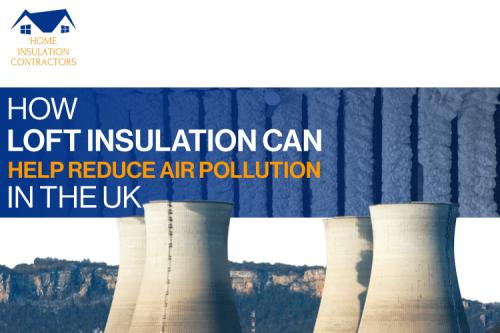Can Loft Insulation Reduce Air Pollution in the UK?

Loft
insulation has several environmental advantages and is essential to
lowering your home's carbon footprint. Your heating systems are more effective
when you install more insulation in your homes.
In essence, you'll save money on
your energy expenses and minimise emissions thereby reducing indoor air
pollution to a considerable extent.
The roof space is where more than
half of the heat in your house gets dissipated. A cost-effective and
ecologically friendly option to prevent heat loss from your home and save money
is to insulate it.
You can approach installers from Home Insulation Contractors
who can offer you eco-friendly options for your home insulation project and get
in touch with local as well as national insulation companies in a single
click.
What is the mechanism of Loft Insulation?
When your property is fully heated, a large portion
of the heat departs through your roof space, so by having the appropriate
quantity of insulation, you might also prevent that from happening. Loft
insulation works by limiting the heat that escapes through the floor of the
loft. The features of Loft Insulation include:
- a significant drop in energy savings
- very easy and speedy installation
- enhances the value of your home by keeping the
heat in place
- increases the energy efficiency rating of your
home
If you insulate your loft, you may be able to reduce
your annual energy costs by up to £225 for a detached home and near about £135
for a semi-detached home. This implies that if you install loft insulation in
the home, it will pay for itself within a few years and even preserve the
environment significantly.
Potential Health Advantages of Loft Insulation
Improved indoor air quality, less noise pollution,
and a decreased risk of mould formation are just a few of the health advantages
of insulating your home with spray
foam loft insulation.
Two million more years of life would be added if the
UK's net zero targets were accomplished. According to a recent report, home
enhancements to energy efficiency may have the highest impact of all the
measures aimed at achieving net zero. Insulation in lofts alone resulted in an
increase of almost 800,000 life years in the UK.
That startling statistic led us to wonder if
lowering greenhouse gas emissions may improve the health of a population as a
whole and whether a home’s energy efficiency can do the same for its occupants.
Dust, pollen, and harmful gases are a few examples of
external contaminants and allergens that insulation can help keep out of your
home by blocking openings in the floor or walls. This may enhance indoor air
quality, lessen allergies and respiratory problems, and potentially lower the
likelihood of developing lung cancer or any other respiratory issues.
It is crucial to understand that your home needs to
have good ventilation. Putting energy-saving appliances in your home without
providing enough ventilation will expose you to more pollutants produced there,
which could be harmful to your health.
By reducing draughts and hot spots in your home,
insulation aids in maintaining a constant temperature. This could enhance your
overall comfort and help prevent respiratory problems like dry throat, nasal
congestion, and itchy eyes.
Homes with high moisture levels can
support the growth of mould and mildew. Fortunately, insulation helps maintain
stable relative humidity in your home by minimising air leaks, which can
inhibit the development of mould and mildew formation. This can enhance the
quality of the air in your home, lessen the likelihood of allergies caused by
mould, and even help with respiratory conditions like asthma.
Although it might not seem like a
health advantage, lowering the amount of noise coming from the external
atmosphere that enters your home can really lower stress levels, enhance the
quality of your sleep, and make your house seem more comfortable overall.
The amount of outside noise that enters your home can be decreased using insulation, such as loft insulation and double-glazed windows, creating a quieter and healthier living environment for residents of the UK.
Conclusion
Reduced energy usage and considerable reductions in
carbon emissions are the results of effective loft insulation in your loft
space. Loft insulation will significantly improve the environmental
friendliness of your home and help you reduce your carbon footprint. In many
cases, the materials used for loft insulation are derived from recycled
resources.
Not only this, you can obtain a higher grade for your
home's energy performance by using effective loft insulation. You can properly
insulate your loft and raise the value of your property when you understand the advantages it may provide for the environment as well as for
your property.
Post Your Ad Here
Comments